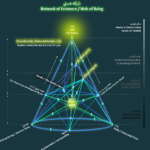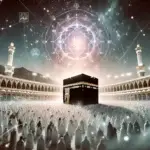The Concept of Hadath and Ghusl: A Philosophical and Ontological Perspective

Short Answer
The term Hadath refers to a state that nullifies spiritual purity (Taharah), requiring acts like Wudu, Ghusl, or Tayammum to restore it. It is categorized into:
- Minor Hadath (Asghar): Examples include urination (Boul) or defecation (Gha’et).
- Major Hadath (Akbar): Examples include seminal discharge, sexual intercourse, menstruation, and even death.
Ghusl during Major Hadath serves to restore physical and spiritual balance disrupted by such events. Death, as a Major Hadath, also necessitates Ghusl to purify the deceased’s body and soul.
Scientific Explanation
Human physiology is regulated by two types of nervous systems:
- Sympathetic nerves: Activate body systems.
- Parasympathetic nerves: Slow down bodily activities.
During peak physical or emotional states, such as intimate relations or death, the balance between these systems is disrupted. Events like ejaculation, menstruation, or the departure of the soul from the body cause dominance of the parasympathetic system, creating an imbalance.
How Water Restores Balance
- Water contact activates the sympathetic nerves, helping restore balance and calm the body.
- In cases of Major Hadath (e.g., Janaabah), Ghusl requires full-body cleansing to reset this balance, as these events impact the entire system.
- For the deceased, Ghusl Mayyit (ritual washing) not only cleans external impurities but also alleviates the spiritual tension caused by the soul’s separation from the body. Even in sleep, a form of Minor Hadath, Wudu (a partial cleansing) is prescribed for spiritual and physiological renewal.
The interconnectedness of the soul and body means the deceased still feels the effects of external purification, as the soul remains relatively connected to the body after death.
Ontological Explanation
The universe comprises two realms:
- Mulk (Physical World): The material and worldly domain.
- Malakut (Spiritual World): The higher spiritual domain connected to God.
Spiritual Impurities (Najis)
- Certain entities, like urine, blood, and corpses, are spiritually impure (Khubth Batin). While not useless, they are distant from the spiritual realm of Malakut.
- The human body is spiritually pure as long as the soul resides within it, as the soul originates from Malakut. However, upon death, the body becomes akin to any other impure material (e.g., flesh and blood), disconnected from the higher spiritual domain.
The Purpose of Ghusl for the Dead
After death, the body and soul experience:
- Physical impurities: External dirt and decay.
- Spiritual imbalance: Anxiety and detachment during the soul’s transition.
Ghusl Mayyit cleanses the body and prepares the soul to meet God, the Ahl al-Bayt, and angels in a purified state, free from worldly impurities. This mirrors the purification process required for worship or spiritual acts during life.
Conclusion
At death, both Minor and Major Hadath occur simultaneously, requiring the deceased to be purified through Ghusl. The use of water in a prescribed manner ensures both physical cleanliness and spiritual readiness. The specific rituals of Wudu and Ghusl hold spiritual significance, as deviating from them might achieve physical cleanliness but fail to bring about the desired spiritual purity.
Water, as a universal cleanser, symbolizes renewal and balance, making it the perfect medium for both physiological and spiritual purification.








